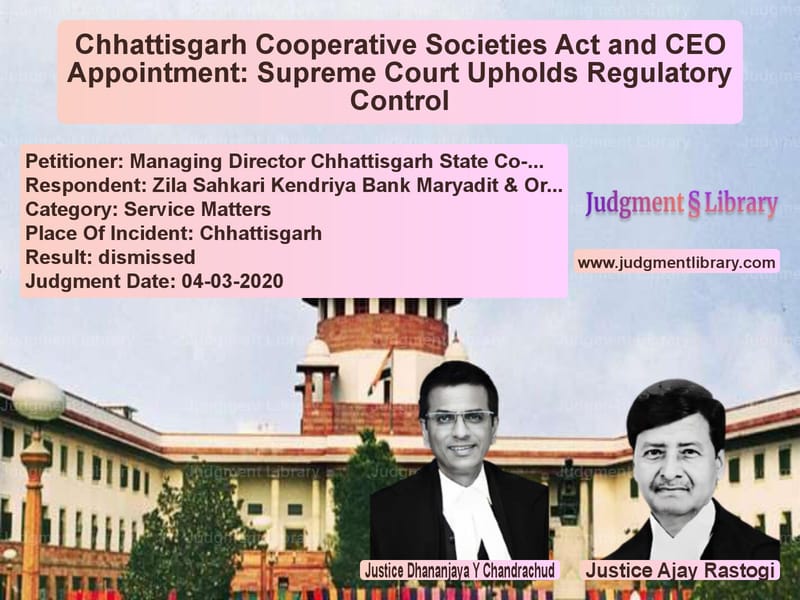Chhattisgarh Cooperative Societies Act and CEO Appointment: Supreme Court Upholds Regulatory Control
The case of Managing Director Chhattisgarh State Co-Operative Bank Maryadit vs. Zila Sahkari Kendriya Bank Maryadit & Ors. addresses a critical issue in the cooperative banking sector concerning the appointment of Chief Executive Officers (CEOs) in cooperative banks under the Chhattisgarh Cooperative Societies Act, 1960. The Supreme Court was called upon to interpret the powers of the apex body (Chhattisgarh State Co-operative Bank) in appointing a CEO for a Central Cooperative Bank in the context of the regulatory framework and recent amendments to the law.
Background of the Case
The Chhattisgarh State Co-operative Bank (the appellant) is the apex cooperative society in the state, while the Zila Sahkari Kendriya Bank (the first respondent) is a district central cooperative bank. In 2017, the CEO of the first respondent bank was arrested on corruption charges and suspended. The appellant, exercising its powers under the Chhattisgarh Cooperative Societies Act, appointed the sixth respondent as the new CEO. However, the first respondent challenged this appointment, arguing that the power to appoint the CEO lies exclusively with the board of the cooperative bank itself, not the appellant.
The issue became a matter of judicial scrutiny when the Board of Directors (BoD) of the first respondent sought clarification from the Registrar of Cooperative Societies, who initially ratified the appointment. Later, the matter was escalated to the High Court of Chhattisgarh, where the Division Bench ruled in favor of the first respondent. The appellant challenged this ruling in the Supreme Court, raising the issue of the legality of the appointment made by the apex body.
Petitioner’s Arguments
The appellant, the Managing Director of Chhattisgarh State Co-operative Bank, argued that:
- Under Section 54(3) of the Chhattisgarh Cooperative Societies Act, the State Government, through the Apex Society, had the authority to appoint a CEO for the first respondent.
- The appointment of the sixth respondent as CEO was made based on the powers granted to the appellant as the Apex Society under the 1960 Act and a notification issued in 1971.
- The appointment was necessary to maintain financial control and proper management of the cooperative banks, especially since public funds were at stake.
- Even though the Board of Directors of the first respondent later ratified the appointment, the appellant’s initial authority to appoint the CEO was valid under the relevant laws.
Respondent’s Arguments
The first respondent, Zila Sahkari Kendriya Bank, contended that:
- Under the amended provisions of Section 54(3) of the 1960 Act, the power to appoint a CEO resides solely with the Board of Directors of the cooperative bank.
- The appellant, as the Apex Society, had no legal authority to make such appointments without the explicit consent of the Board of Directors of the first respondent.
- The appointment of the sixth respondent violated the cooperative governance norms and was not in compliance with the statutory framework governing Central Societies.
- The ratification by the Registrar of Cooperative Societies could not validate an otherwise unauthorized action by the appellant.
Supreme Court’s Observations
The Supreme Court examined the interpretation of key provisions of the Chhattisgarh Cooperative Societies Act, particularly Section 54(3), and the powers of the Apex Society in appointing the CEO of a Central Cooperative Bank. The Court made the following observations:
- The power to appoint the CEO is vested with the cooperative society as per the provisions of Section 54(1) of the Act. However, Section 54(3) grants the State Government the authority to notify specific classes of societies (including cooperative banks) that must employ officers from a cadre constituted by the Apex Society.
- While the appellant had the right to appoint a CEO from the cadre, the current amendments and notifications clarified that the final decision to appoint the CEO must be made by the Board of Directors of the respective bank, in line with the statutory framework.
- The power to appoint a CEO is not absolute and must adhere to the eligibility criteria set by the Reserve Bank of India (RBI) and the requirements of Section 49-E(2) of the Act.
- The Court emphasized the need for harmonious construction of the provisions, acknowledging the role of both the Apex Society and the individual Cooperative Bank in ensuring proper governance.
Final Judgment
The Supreme Court ruled:
“The appointment of the sixth respondent by the appellant is not in accordance with the provisions of the Chhattisgarh Cooperative Societies Act. The decision of the High Court is upheld, and the appointment of the CEO shall be made by the Board of Directors, adhering to the statutory framework and eligibility criteria.”
The Court held that the appellant could play a role in the process but that the final decision must rest with the Board of Directors of the Central Cooperative Bank. The appeal was dismissed with no order as to costs.
Impact of the Judgment
This ruling clarifies several important legal points for cooperative banks and apex societies:
- Governance and Appointment Process: The Court reinforced that the appointment of a CEO for a cooperative bank is not solely within the power of the Apex Society and must involve the Board of Directors.
- Role of the Apex Society: The Apex Society’s role is regulatory, ensuring the proper functioning of the cooperative network, but it cannot bypass the governance structures of individual cooperative banks.
- Harmonious Interpretation: The judgment emphasizes that statutory provisions must be interpreted harmoniously to avoid conflicts between the general powers of the Apex Society and the specific rights of the Board of Directors of cooperative banks.
The decision also ensures that the democratic governance structure of cooperative banks is respected, which is essential for maintaining accountability and transparency in the management of public funds.
Petitioner Name: Managing Director Chhattisgarh State Co-Operative Bank Maryadit.Respondent Name: Zila Sahkari Kendriya Bank Maryadit & Ors..Judgment By: Justice Dhananjaya Y Chandrachud, Justice Ajay Rastogi.Place Of Incident: Chhattisgarh.Judgment Date: 04-03-2020.
Don’t miss out on the full details! Download the complete judgment in PDF format below and gain valuable insights instantly!
Download Judgment: Managing Director Ch vs Zila Sahkari Kendriy Supreme Court of India Judgment Dated 04-03-2020.pdf
Direct Downlaod Judgment: Direct downlaod this Judgment
See all petitions in Employment Disputes
See all petitions in Promotion Cases
See all petitions in Public Sector Employees
See all petitions in Recruitment Policies
See all petitions in Judgment by Dhananjaya Y Chandrachud
See all petitions in Judgment by Ajay Rastogi
See all petitions in dismissed
See all petitions in supreme court of India judgments March 2020
See all petitions in 2020 judgments
See all posts in Service Matters Category
See all allowed petitions in Service Matters Category
See all Dismissed petitions in Service Matters Category
See all partially allowed petitions in Service Matters Category







